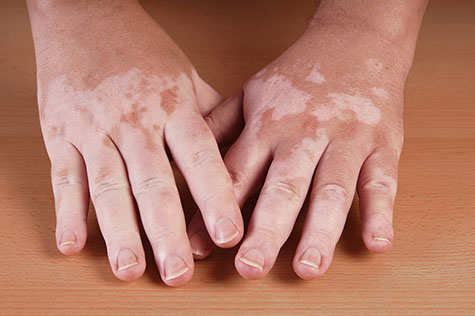What Causes Vitiligo?

Vitiligo is an autoimmune condition in which the immune system attacks melanocytes, which are the skin cells that produce pigment. Unfortunately, it is not well-understood why this occurs in people with vitiligo. There is thought to be a genetic susceptibility to vitiligo, but this is unlikely to be the only cause of this condition.
What Types of Vitiligo Are There?
There are two primary types of vitiligo:
- Non-segmental vitiligo, which tends to be bilateral and symmetrical in distribution
- Segmental vitiligo, which tends to be a single white patch sometimes with an irregular border
Who Gets Vitiligo?
Vitiligo is equally common among people of all races and genders. You might be more likely to develop vitiligo if you have:
- A close relative with the condition
- An autoimmune disease
About 50% of people with vitiligo will see some pigmentation loss before the age of 20 and 80% will see pigmentation loss before the age of 30.
How Can I Prevent Vitiligo?
Unfortunately, there is no known way to prevent vitiligo at this time. In some cases, you may see new areas of pigmentation loss after injuring your skin or getting a tattoo if you have vitiligo. Thus, vitiligo patients are advised not to get tattoos unless they are comfortable potentially developing new patches in the areas of the tattoos.
Why Treat Vitiligo?
It is not necessary to treat vitiligo if the appearance does not bother you, but it is still advisable to consult with a dermatologist to confirm the diagnosis. Patients with vitiligo can have a higher likelihood of developing other autoimmune diseases, such as thyroid disease, diabetes, or systemic lupus and sometimes additional testing for these diseases is recommended. Once a diagnosis of vitiligo is confirmed, you can discuss treatment options with your board-certified dermatologist to address your primary concerns.

How Can I Treat Vitiligo?

Your dermatologist may suggest one or a combination of the following treatments for vitiligo:
- Cosmetic makeup to camouflage lost pigment
- Topical medications, such as a corticosteroids, to restore lost pigment
- Ultraviolet light therapy (phototherapy) to restore lost pigment
- Laser treatment (ex. Excimer laser) to restore lost pigment
Schedule an Appointment
If you notice areas of depigmented skin on your body or face, you may want to schedule an appointment with a board-certified dermatologist to evaluate your concerns and determine whether you have vitiligo or another skin condition. At Arlington Dermatology, you can consult with a board-certified dermatologist who will develop a customized treatment plan that suits your specific needs and goals.
To schedule your appointment at Arlington Dermatology, please call our office or contact us online.


